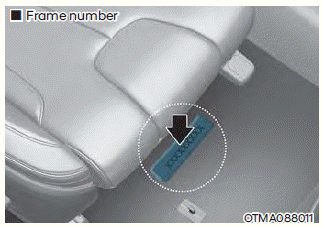Hyundai Santa Fe: General Information / Warning and Caution Labels
Hyundai Santa Fe (TM) 2019-2025 Service Manual / General Information / Warning and Caution Labels
| Warning and Caution Labels |

| 1. Radiator cap
caution 2. Fan caution |
3. Battery caution |
Battery Caution Label

Warning / Caution Label (Cont'd)
|
A. Keep lighted cigarettes and all other flames or sparks away from the battery. |
|
B. Wear eye protection when charging or working near a battery. Always provide ventilation when working in an enclosed space.
|
|
C. Keep batteries out of the reach of children because batteries contain highly corrosive SULFURIC ACID. Do not allow battery acid to contact your skin, eyes, clothing or paint finish. |
|
D. If any electrolyte gets into your eyes, flush your eyes with clean water for at least 15 minutes and get immediate medical attention. If possible, continue to apply water with a sponge or cloth until medical attention is received. If electrolyte gets on your skin, throughly wash the contacted area. If you feel a pain or a burning sensation, get medical attention immediately. |
|
E. Always read the following instructions carefully when handing a battery. |
|
F. Hydrogen, which is a highly combustible gas, is always presents in battery cells and may explode if ignited. |
|
G. An improperly disposed battery can be harmful to the environment and human health. Always confirm local regulations for battery disposal. |
Handling and Storage the Battery
|
Battery Itself |
|
||||||
|
Battery on Vehicle |
|
After reconnecting or recharging a discharged battery, the ESP OFF indicator
may illuminate.
In this case, turn the handle half way to the left and right whilst
the ignition switch is in the ON position.
Then, restart the engine after the ignition is OFF.
The ESP OFF indicator may turn OFF.
If the ESP OFF indicator does not turn OFF, have the system checked.
(Refer to the DTC guide)
|
 Identification Numbers
Identification Numbers
Identification Number
Identification Number Description
Vehicle Identification Number
1.
World Manufacturer Identifier (WMI)
- KMH : Passenger vehicle or MPV(Multipurpose Passenger Vehicle)/SUV(Sports
Utility Vehicle)/RV(Recreational Vehicle)
2...
 Lift and Support Points
Lift and Support Points
Lift and Support Points
[Two-Post Car Lift]
1.
Place the lift blocks under the support points as shown in the illustration...
Other information:
Hyundai Santa Fe (TM) 2019-2025 Service Manual: Front Seat Belt Buckle. Components and components location
..
Hyundai Santa Fe (TM) 2019-2025 Service Manual: High Mounted Stop Lamp. Repair procedures
Removal High Mounted Stop Lamp 1. Disconnect the negative (-) battery terminal. 2. Remove the rear spoiler. (Refer to Body - "Rear Spoiler") 3...
Categories
- Manuals Home
- 4th Generation Santa Fe Owners Manual
- 4th Generation Santa Fe Service Manual
- Electronic child safety lock
- Repair procedures
- Instrument panel overview
- New on site
- Most important about car
Vehicle Identification Number (VIN). Vehicle certification label. Tire specification and pressure label
Vehicle Identification Number (VIN)

The vehicle identification number (VIN) is the number used in registering your vehicle and in all legal matters pertaining to its ownership, etc.
The number is punched on the floor under the passenger seat. To check the number, open the cover.
Copyright © 2025 www.hsafe4.com

